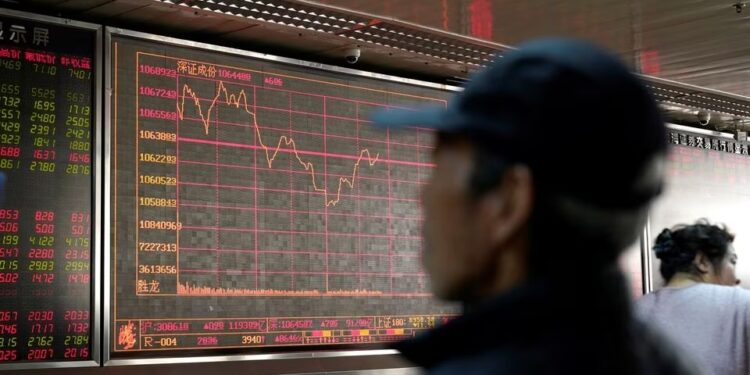Asian shares tracked Wall Street lower on Wednesday as U.S. yields stood near four-month highs, while a powerful earthquake in the region raised concerns about possible disruptions to the vital chip-making industry.
In Asia, MSCI’s broadest index of Asia-Pacific shares outside Japan (.MIAPJ0000PUS), fell 0.7%. Japan’s Nikkei (.N225),dropped 0.8%, after a 20% blockbuster rally in the first quarter.
Taiwan’s shares (.TWII), skidded 0.5% after a 7.2 magnitude earthquake rocked the island, collapsing buildings, killing at least four people and injuring dozens.
Taiwan makes up about 90% of chipmaker TSMC’s (2330.TW), production. The group’s shares fell 0.9% after it said some facilities were evacuated following the quake. It later said evacuated employees were beginning to return to work.
China’s blue chips (.CSI300), eased 0.2% while Hong Kong’s Hang Seng index (.HSI), fell 0.8%, even as a private sector survey showed the expansion in the services industry picked up pace in March.
On Wall Street, a recent run of solid U.S. economic data – including an unexpected expansion in the manufacturing sector and the slow easing in the labour market – has stoked doubts about the amount of the Fed easing likely this year and next.
A pair of Fed policymakers on Tuesday both said they think it would be “reasonable” to cut U.S. interest rates three times this year, but markets only see about 69 basis points in easing.
“At this last meeting, they still indicate three times, but these movements tend to have some momentum. As they start to shift, you find that they will probably shift again next meeting and then by next meeting, they probably will be indicating that they’re going to cut only twice,” said Andrew Lilley, chief rates strategist at Barrenjoey in Sydney.
“And there’s a very high chance of one in three that they don’t ease at all.”
The three major Wall Street indexes (.DJI), (.SPX), (.IXIC), opens new tab fell about 0.7%-1%. Tesla (TSLA.O), shares lost about 5% after quarterly deliveries fell for the first time in nearly four years.
Long-term Treasury yields climbed to multi-month highs overnight before paring some of the movements. The benchmark 10-year yield was steady at 4.3572% on Wednesday, after hitting a four-month high of 4.405% overnight.
Investors now await euro zone inflation data, which could surprise on the downside after German inflation eased more than expected. In the U.S., a private payrolls report and a services sector survey are the key data risks, along with a speech from Fed Chair Jerome Powell on the economic outlook.
In currency markets, the dollar failed to get a lift from higher yields but still loomed large against its major peers. The yen was jittery at 151.57 per dollar, just a whisker away from the 152 level that prompted authorities to intervene in late 2022.
Oil held near five-month highs on worries about tighter supplies ahead of an OPEC+ meeting where the group is unlikely to change output policy. Brent <LCOc1> rose 0.1% to $89.00 a barrel, while U.S. crude was little changed at $85.15 per barrel.
Gold prices extended their record rally on Wednesday. Spot gold rose 0.1% to $2,282.58 per ounce, after hitting an all-time high of $2,288.09 earlier in the session.
Source: Reuters



Recent Comments